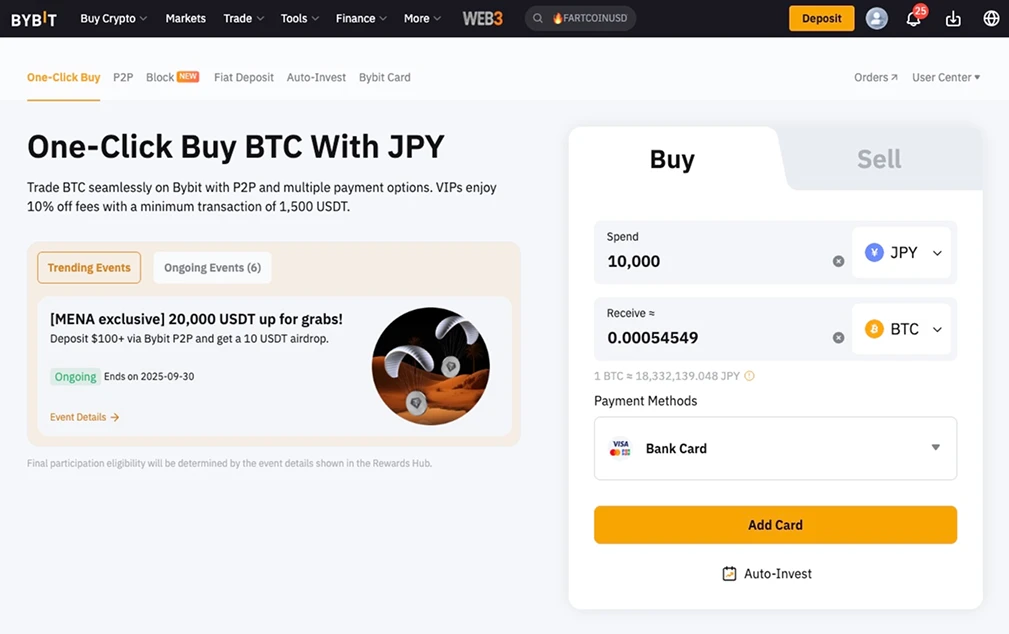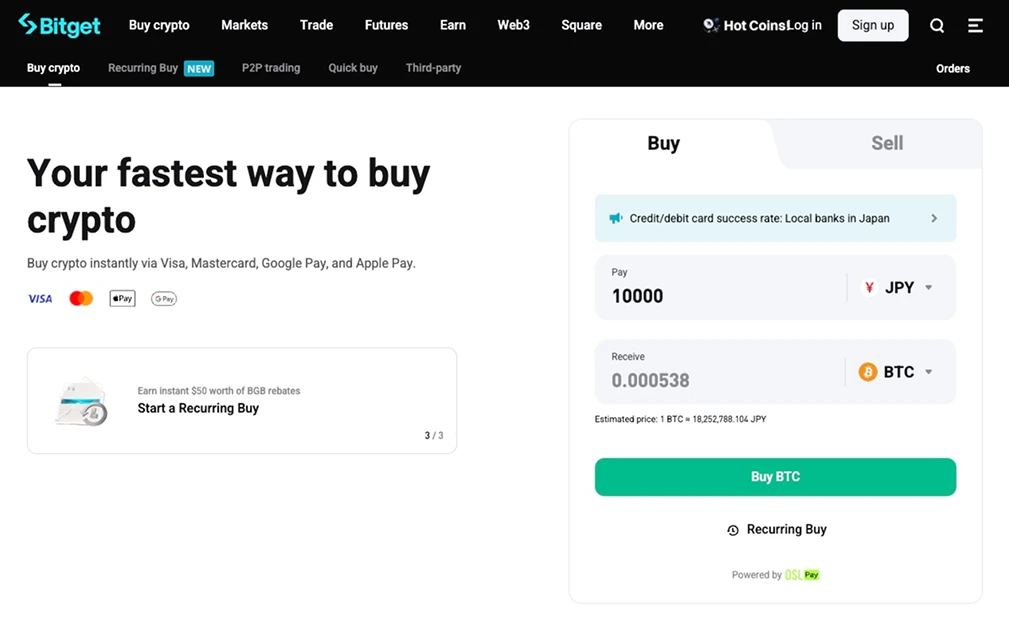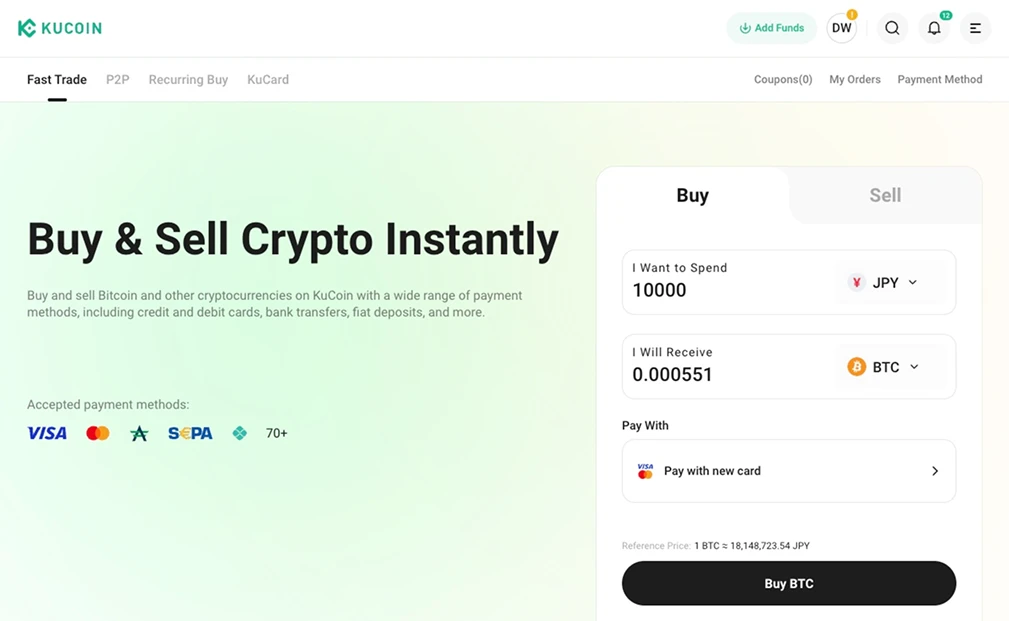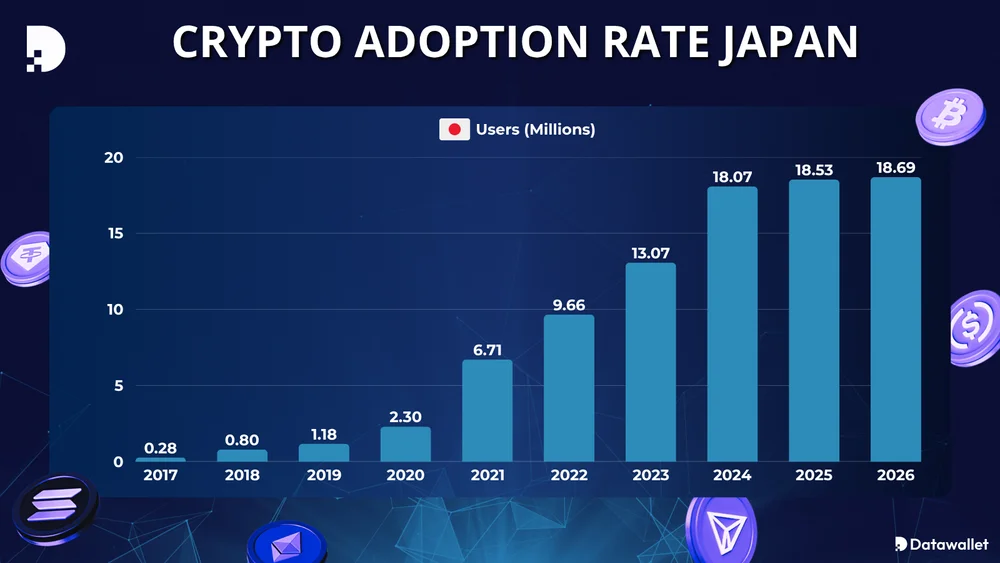Best Crypto Exchanges in Japan
.webp)
Summary: Japan is respected in the crypto world, with a regulatory framework built around investor protection. Its Financial Services Agency (FSA) demands that all exchanges register and meet strict standards for anti-money laundering, KYC compliance, and safeguarding user assets.
Here are the six best cryptocurrency exchanges supporting Japanese Yen (JPY) deposits:
Bybit is the best overall cryptocurrency platform in Japan due to its wide selection of assets, diverse JPY deposit options, and user-friendly experience with live customer support in Japanese.
Available Assets
2,100+ Cryptocurrencies
Fees
0.1% Spot Trading Fee
JPY Deposit Methods
Bank Transfer, Cards, Line Pay and PayPay
Top Crypto Trading Platforms in Japan
Japan presents a highly structured environment for digital asset trading, governed by the Financial Services Agency (FSA) under its Payment Services Act. Below is a comparison table highlighting the leading platforms serving Japanese investors, with attention to JPY deposit methods, fee transparency, security standards, available digital currencies, and platform features.
1. Bybit
Bybit is one of the most advanced cryptocurrency exchanges available to Japanese traders, combining deep liquidity, competitive fees, and an expansive range of products. Founded in 2018, it has over 74 million registered users and processes a 24-hour trading volume exceeding $35 billion.
The exchange offers an extensive lineup of trading markets, including spot trading, perpetual and inverse futures with leverage up to 200x, and options trading. The Copy Trading ecosystem is one of the most active globally, featuring over 32 million successful trades and 800,000+ followers.
Beyond trading, Bybit’s Earn offers flexible savings, fixed-term staking, dual asset products, liquidity mining, and structured yield strategies. The Bybit Card allows crypto spending with up to 10% cashback, and its Web3 division gives users direct access to dApps, token launches, and NFT trading.
Platform Highlights:
- Fees: Spot trading from 0.1% and futures maker fees from 0.01%.
- Supported Assets: 2,100+ cryptocurrencies.
- Regulation & Licensing: Operates in Japan under global licenses.
- JPY Deposit Methods: Apple Pay, Google Pay, Visa, Mastercard, JCB Card, bank transfer (via P2P), PayPay (via P2P), Line Pay (via P2P), 7/11 Convenience Store (via P2P).

2. Binance
Binance is the largest cryptocurrency exchange in the world, with over 284 million registered users. The platform is known for its vast product range and strong liquidity. Japanese investors benefit from local language support, JPY deposits, and compliance with the Financial Services Agency (FSA).
With over 350 supported cryptocurrencies, Binance offers deep markets for both major assets like BTC and ETH, and emerging tokens. One of the most attractive features for customers is its Copy Trading service, which allows users to automatically mirror the trades of top-performing lead traders.
Alongside copy trading, Binance offers spot, margin, and futures markets, a powerful trading bot marketplace, and institutional-grade algorithmic order execution tools like TWAP and POV. For passive investors, Binance Earn supports over 300 crypto assets with flexible and locked-term yield products.
Platform Highlights:
- Fees: Spot fees from 0.1% (discounted with BNB), futures maker fees as low as 0.02%.
- Supported Assets: 350+ cryptocurrencies.
- Regulation & Licensing: Binance Japan Inc. is regulated by the FSA as a Crypto Asset Exchange Service Provider (Registration Number: Kanto Local Finance Bureau 00031).
- JPY Deposit Methods: Bank transfers, credit cards, debit cards, Pay-easy, and convenience store payments.
%201.webp)
3. Bitget
Bitget has become a popular choice for Japanese traders thanks to its competitive trading features, advanced passive income tools, and strong security measures. Founded in 2018, the exchange now supports over 800 cryptocurrencies and handles high daily trading volumes of $5 billion.
The platform is recognized for its Earn suite, which offers various staking and yield-generation products. Options include Simple Earn for flexible or locked savings, On-chain Earn for blockchain-native yields, Structured Earn for higher-risk, higher-return opportunities, and lending or borrowing services.
Active traders can access futures with leverage up to 125x, spot and margin trading, and advanced order types through an interface powered by TradingView charting tools. Security is reinforced with a $758 million Protection Fund and proof-of-reserves with a guaranteed 1:1 reserve ratio.
Platform Highlights:
- Fees: Spot trading fees from 0.1%; futures maker fees from 0.02%.
- Supported Assets: 800+ cryptocurrencies.
- Regulation & Licensing: Operates in Japan with global licensing.
- JPY Deposit Methods: Credit cards, debit cards, Apple Pay, Google Pay.

4. bitFlyer
bitFlyer is one of Japan’s most trusted crypto exchanges, holding an unbroken nine-year streak as the top domestic Bitcoin trading platform by volume. Founded in 2014, it operates under full registration with the FSA and is a member of the Japan Virtual and Crypto Assets Exchange Association (JVCEA).
Casual users can buy over 30 other cryptocurrencies from as little as JPY 1, with no fees on Buy/Sell orders or transfers from certain banks. More experienced traders can use bitFlyer Lightning, an advanced trading interface supporting spot and OTC crypto CFDs with up to 2x leverage.
Automated recurring buys, a Bitcoin rewards credit card, and the ability to convert V-POINT into Bitcoin add to its appeal for retail investors. bitFlyer stores the majority of assets in offline cold wallets, implements multi-signature protocols, and complies with stringent AML/CFT standards.
Platform Highlights:
- Fees: Zero fees on Buy/Sell orders; Lightning spot and CFD fees start from 0.2%.
- Supported Assets: 38 cryptocurrencies.
- Regulation & Licensing: Licensed by the FSA; JVCEA member; FIBO No. 3294 registration.
- JPY Deposit Methods: Bank transfer, credit cards, debit cards, convenience store (Konbini) payments, and Line Pay.
.webp)
5. KuCoin
KuCoin is one of the largest global exchanges, with over 40 million users across 200+ countries. The platform supports 900+ coins and maintains a daily trading volume above $6.8 billion, offering traders access to major assets and early listings of emerging tokens through its GemSPACE feature.
Its key offering is its Trading Bot marketplace, where users can deploy spot grid bots, futures grid bots, dollar-cost averaging (DCA) bots, and rebalancing bots. Beyond bots, KuCoin provides spot trading, margin trading with leverage, derivatives markets, and KuCoin Earn.
KuCoin’s security framework includes independently verified Proof of Reserves, multi-layer encryption, and cold wallet storage for the majority of assets. It offers 24/7 customer support, a multilingual interface and maintains a global community in over 20 languages, including Japanese.
Platform Highlights:
- Fees: Spot fees from 0.1%; futures maker fees from 0.02%.
- Supported Assets: 900+ cryptocurrencies.
- Regulation & Licensing: Operates in Japan through global licenses.
- JPY Deposit Methods: Bank transfers, credit cards, debit cards.

6. Bitbank
Bitbank is one of Japan’s largest exchanges, consistently ranking No.1 in domestic altcoin trading volume according to JVCEA statistics from 2024–2025. Founded in 2014 and fully registered with the FSA, it offers a feature-rich platform that appeals to both beginner and professional traders.
The platform provides multiple trading options: a spot exchange for deep order-book trading, a simple Buy/Sell interface with no transaction fees, and margin trading with leverage. Long-term investors can take advantage of the crypto lending program, which offers annual rates of up to 5% on deposited assets.
For advanced traders, Bitbank integrates TradingView charting, offering over 70 technical indicators, multiple chart types, and comparative analysis tools. It also provides robust API support for system trading, plus a VIP Program with reduced fees and dedicated account support.
Platform Highlights:
- Fees: Maker rebates from -0.02%, taker fees from 0.12% on the spot exchange.
- Supported Assets: 30+ cryptocurrencies.
- Regulation & Licensing: Licensed FSA exchange (登録番号 第00004号); JVCEA member.
- JPY Deposit Methods: Bank transfers.
.webp)
Is Cryptocurrency Regulated in Japan?
Japan established a clear legal framework for digital assets starting with the Payment Services Act (PSA), first enacted in 2017, which recognized cryptocurrencies as electronic “property” and required crypto exchanges to register with the Financial Services Agency (FSA).
These platforms must meet strict requirements, such as segregating customer funds, maintaining cold‑wallet storage, conducting anti‑money laundering and KYC checks, and operating with audited financial records, to ensure maximum investor protection and system integrity.
In 2025, the FSA proposed a landmark shift, reclassifying certain digital assets under the Financial Instruments and Exchange Act (FIEA), effectively treating them as financial products. This move would apply investor protection rules, disclosure mandates, and insider‑trading restrictions to governance and investment‑oriented tokens.
How is Crypto Taxed in Japan?
The National Tax Agency (NTA) treats gains from cryptocurrencies as miscellaneous income, meaning profits from trading, crypto-to-crypto conversions, staking, airdrops, mining, spending crypto, or receiving bonus rewards must be declared under income tax rules. Taxation applies only when the total miscellaneous income exceeds ¥200,000 per year.
Here is a summary of how cryptocurrency is taxed in Japan:
- Income Tax: Rates follow a progressive structure from 5 % up to 45 % based on income brackets. There is also a fixed 10 % inhabitant tax (covering both prefectural and municipal obligations), resulting in effective totals ranging from approximately 15 % to as high as 55 %.
- Inheritance and Gift Tax: If cryptocurrency is inherited or gifted, it is subject to Japan’s inheritance and gift tax, with rates ranging from 10% to 55%, depending on the amount received.
Japan’s FSA has proposed a landmark reform to take place in 2026 that reclassifies crypto assets under the Financial Instruments and Exchange Act (FIEA). If adopted, this would align crypto gains with those from stocks, applying a flat 20 % tax rate, plus standard local taxes, and introduce features like loss carry-forward for offsetting future gains.
Cryptocurrency Adoption in Japan
Cryptocurrency adoption in Japan is rooted in strong regulatory clarity and a tech-forward investor base. While the market is less reactive to inflation or currency devaluation than in emerging economies, Japanese users are steadily integrating crypto into their portfolios thanks to the country’s progressive legal framework and broad exchange access.
User engagement is climbing, with current estimates suggesting that around 14.70% of Japan’s population interacts with cryptocurrencies, with projections placing it closer to 15.26% by 2026. Japan’s structured, security-focused ecosystem positions it among the world’s most mature crypto markets, alongside the U.S., South Korea, and Germany.

How to Buy Bitcoin in Japan
Japanese investors looking to purchase Bitcoin (BTC) should use cryptocurrency exchanges registered with the Financial Services Agency (FSA). Japan’s licensing framework ensures platforms meet strict standards for asset segregation, cybersecurity, and anti-money laundering compliance.
- Select a Crypto Exchange: Choose an FSA-approved exchange with a strong security record and transparent fees. Popular options in Japan include Bybit, bitFlyer, and Binance, each offering full yen support and localized interfaces.
- Create Your Account: Sign up on the chosen platform and complete identity verification (KYC). This usually requires a government-issued ID such as a My Number card, driver’s license, or passport, along with proof of address like a utility bill.
- Deposit Japanese Yen (JPY): Fund your account using local payment methods widely supported in Japan. These typically include domestic bank transfers, convenience store deposits, or card payments through approved processors.
- Purchase Bitcoin (BTC): Once your JPY balance is available, access the Bitcoin trading screen. Enter either the yen amount you want to invest or the exact BTC quantity you wish to buy, then confirm your order details before executing the trade.
- Secure Your Bitcoin: After the purchase, transfer your BTC from the exchange to a private wallet for maximum security. Hardware wallets such as Ledger or Trezor offer the strongest protection, while reputable software wallets can also provide safe custody with proper password management and two-factor authentication.
By following these steps, Japanese investors can enter the Bitcoin market with confidence, knowing they are operating under one of the world’s most comprehensive regulatory systems.
Final Thoughts
Japan’s cryptocurrency market offers a secure, regulated environment with multiple high-quality exchanges to suit different trading styles. Evaluating each platform’s fees, asset range, security track record, and deposit methods will help ensure a safe entry into Japan’s growing digital asset ecosystem.
Investors should choose a platform that aligns with their goals, whether that means advanced derivatives on Bybit, copy trading on Binance, staking options on Bitget, domestic reliability on bitFlyer, automation tools on KuCoin, or deep local liquidity on Bitbank.
Frequently asked questions
Can foreigners legally trade cryptocurrency in Japan?
Yes. Foreign residents in Japan can open accounts with FSA-registered exchanges as long as they complete identity verification (KYC) using valid residency documents and proof of address. Non-residents generally cannot use Japanese exchanges but can trade through overseas platforms that accept their jurisdiction.
Do Japanese exchanges offer cold storage for customer funds?
Yes. Under FSA regulations, licensed exchanges must store the majority of customer assets in offline cold wallets, implement multi-signature access, and maintain segregated accounts to protect funds from operational or financial risks.
What are the common JPY deposit methods supported by crypto exchanges in Japan?
Japanese exchanges typically offer multiple JPY deposit options, including domestic bank transfers, convenience store payments, and popular mobile pay apps like PayPay and Line Pay.
How does Japan regulate stablecoins and prevent crypto outflows?
Recent amendments to Japan’s Payment Services Act introduced a domestic asset-holding rule that restricts stablecoin-based transfers outside Japanese exchanges. This protects users from overseas exchange collapses and keeps crypto assets anchored locally.
%2520(1).webp)
Written by
Antony Bianco
Head of Research
Antony Bianco, co-founder of Datawallet, is a DeFi expert and active member of the Ethereum community who assist in zero-knowledge proof research for layer 2's. With a Master’s in Computer Science, he has made significant contributions to the crypto ecosystem, working with various DAOs on-chain.


%25201%2520(1).webp)

.webp)
.webp)




